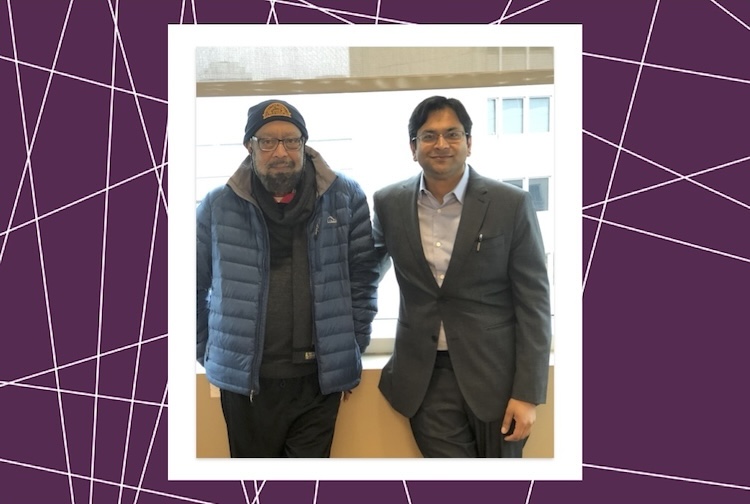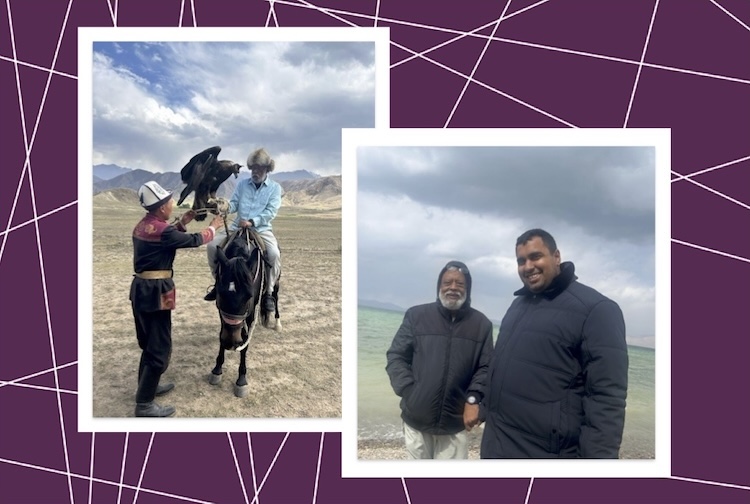A man who desperately needed a new kidney receives a lifesaving gift on Christmas
It was a miracle for Bryjinder Kohli, who felt close to home over the holidays because of the uncommon compassion he experienced at VCU Health Hume-Lee Transplant Center.
December 05, 2024 Bryjinder Kohli continues to fulfil his enduring passion for travel after his kidney transplant. After his surgery in December 2023, Bryjinder and his wife, Ranju, visited the Torres del Paine in the Patagonia region of South America which was a lifelong goal. (Contributed photo)
Bryjinder Kohli continues to fulfil his enduring passion for travel after his kidney transplant. After his surgery in December 2023, Bryjinder and his wife, Ranju, visited the Torres del Paine in the Patagonia region of South America which was a lifelong goal. (Contributed photo)
By Jeff Kelley
Bryjinder Kohli lives to travel. Sometimes he goes it alone, embracing his self-described “hippie” spirit, and other times with his wife and family. He's visited more than 110 countries.
So, the idea of a mere three-hour drive to Richmond and VCU Medical Center from his home in Northern Virginia was never of concern for the 74-year-old.
“I refuse to go anywhere else for my care other than VCU,” he said.
It was Christmas Eve 2023 when his wife, Ranju, sped down Interstate-95 to VCU Medical Center, Bryjinder recalls. Earlier that evening, as the interfaith Kohli family prepared Greek-roasted lamb, a phone call came from VCU Health Hume-Lee Transplant Center: Someone had died who was an organ donor, and that person's organ was a match to Kohli, who needed a kidney.
And Bryjinder's name was up on the national kidney donor waiting list.
Bryjinder was diagnosed in 2007 with a cancerous growth on his kidney, which turned out to be benign. Surgeons removed a portion of his kidney, the organ responsible for filtering waste and excess fluids from the body.
Six years ago, however, he was preemptively diagnosed with end-stage renal disease, caused by diabetes and hypertension. That meant his kidneys would eventually fail, and he would require regular dialysis to flush them out or a transplant to live long-term. Bryjinder was scheduled to start dialysis in January 2024.
[At Hume-Lee], you are our patient for life. You're part of the family.
Amit Sharma, M.D., transplant surgeon at VCU Health Hume-Lee Transplant Center
While people on dialysis can still travel, doing so requires finding local dialysis centers or bringing portable hemodialysis machines and accessories. Still, dialysis isn't viable for long-term survival. Average dialysis patients live between five and ten years, though some longer.
“As medicine improves and we are able to manage chronic diseases like hypertension and diabetes more so than we have in the past, people's lives are being extended,” said Muhammad “Irfan” Saeed, M.D., Hume-Lee's kidney transplant surgical director. “But on the contrary, when you prolong their disease process, eventually these diseases affect your organs. Dialysis is not good for patients, and mortality for dialysis is much higher than transplant.”
According to the American Kidney Fund, there are more than 550,000 people on dialysis in the United States, and about 90,000 on the waiting list for a kidney. VCU Health performs more than 300 kidney transplants per year.
“The best kind of transplant is a patient who is not yet on dialysis, so that they can get the most benefits from transplant,” said Gaurav Gupta, M.D., co-medical director of kidney and pancreas transplant at Hume-Lee.
“Transplant is the gold standard for patients with kidney failure,” Saeed added.
When others say 'No,' VCU Health says 'Yes'
Advanced age paired with chronic disease is considered a risk factor for transplant candidates because the chance of a bad outcome is higher. Such frailty means the patient doesn't have a “buffer” to withstand the risk of heart attack, stroke, and other complications, Saeed said. No amount of advanced testing can completely curb transplant risk.
“But VCU Health has a history of trying to say, 'Yes' to people when they have been declined at other transplant centers,” Saeed said. “We've been fortunate enough that we can help them.”

From left to right: Bryjinder Kohli with Gaurav Gupta, M.D., co-medical director of kidney and pancreas transplant at VCU Health Hume-Lee Transplant Center. (Sara McCloskey, Enterprise Marketing and Communications)
Saeed said every patient is evaluated on a case-by-case basis. There's no age limit for a transplant, and so long as the health of the patient can handle the procedure and other factors align, the patient will be cleared.
“Our goal is to make sure that with the organs made available to us, we make the best of it,” Saeed said. “Giving a 19-year-old kidney to a 75-year-old person is not the best use of that kidney, and I will not put a kidney into a person just for the sake of putting in a kidney. If I wouldn't give it to my family member, I wouldn't give it to another person.”
Uncommon compassion makes patients feel at home
Bryjinder was transplanted on Christmas and was discharged on New Years' Eve.
“The VCU Health nurses went beyond Florence Nightingale. They looked after me like they looked after their grandfather,” he said. “I was so impressed with the service — it is world-class.”
He said he felt even more at home when Saeed and one of Kohli's two surgeons, Amit Sharma, M.D., spoke to him in his native tongue, Punjabi. The language is primarily spoken in the Punjab region of India and Pakistan, where Bryjinder, Sharma, and Saeed are all from.
“It makes the patients more comfortable and creates some bonding when you talk to them in their own native language,” said Sharma, who used his phone to real-time translate for his staff. “This is human behavior — it makes people comfortable, and that's what we do at VCU.”

Bryjinder Kohli loves to experience new things with his family on trips around the world. On a trip to Kyrgyzstan, he tried out falconry and visited lake Song-Kul that's 10,000 feet above sea level with his son, Angad. (Sara McCloskey, Enterprise Marketing and Communications)
The transplant not only saved Bryjinder's life but changed it for the better. Especially for someone, like him, who loves worldly foods but has had to monitor his diet closely.
“One of the joys and pleasures of life is eating good food,” Bryjinder said. “It's very frustrating as a kidney disease patient when you go out to dinner with your friends, and you can't order what you want. You feel stuck.”
Bryjinder's physicians also cleared him to travel again, and he took his first trip post-surgery in October to the Patagonia region in the tip of South America.
“I have two beliefs: God made this planet. And if God created this planet, then how do I go back to Him without seeing it?” he said. “My second belief is that the cost of traveling can be recovered. The cost of not traveling can never be recovered.”
He's had a few complications since surgery, including getting the flu while in Buenos Aires, but his Hume-Lee care team was on top of it even from afar. Overall, his health is stable, and life is normal.
“Our team is well equipped to handle any sort of issues that may arise. We have extensive experience in kidney surgeries and all our team members are highly competent, know what the job is, and are invested in every patient,” Sharma said. “You must trust the system and have faith in your providers. Here, you are our patient for life. You're part of the family.”




